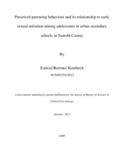| dc.description.abstract | Introduction: Parents play an important role in shaping their children‟s character and are considered an important determinant in several aspects of their children‟s outcome including initiation of sex. Adolescents in Kenya are reported to engage in early sexual behaviour increasing the risks to HIV/AIDS/STIs, unwanted pregnancies, abortions, deaths, psychological traumas, school dropout among many other problems, Yeboah-Tenkorang and Maticka-Tyndale (2003)
Objective: the objective of this study was to examine the association between perceived parenting behaviour and early initiation of sexual behaviour among adolescents in urban public secondary schools in Nairobi County.
Hypothesis: There is no significant association between adolescent‟s early sexual initiation and perceived parenting behaviour
Method: Cross-sectional descriptive quantitative design. A multistage cluster sampling technique was used; the first stage was the random selection of one district out of the 9 districts in Nairobi County. All the schools in the selected district formed the sampling frame. The second stage was the random selection of 5 schools within the district. The third stage was the random selection of 1 stream within a class in each school. For each approached school, one stream per class (Form 1 – 4) was randomly selected and all students in that stream were recruited.
The target group was school going students aged between 13 -19 years in urban public secondary schools in Nairobi County. Self-administered questionnaires was used to assess the perceived parenting behaviour using Egna Minnen Betraffande Uppfostran questionnaire for children (EMBU-C) (Muris, Meesters, & Brake, 2003) and sexual behaviour was assessed using a modified WHO Illustrative Questionnaire for interview survey with young people (Piedmont & Village, 2009). The sample size was 620 students. The variables of the study are parenting behaviour and early sexual initiation.
Data Analysis: Analysis was done using statistical program for social sciences SPSS version 21. Data was collected using standardized quantitative tools and entered into a password protected Microsoft Access Database. Data entry was done and once it was complete, the raw soft copy data was compared with the hard copy data to ensure correctness. Exploratory data analysis was then conducted to determine outliers and inconsistencies. Once data quality issues were resolved, continuous variables were summarized using measures of central tendency and dispersion
(Mean, Median, Min, Max, Range, IQR) while nominal variables were summarized using frequencies and percentages.
In the EMBU-C tool, principal components analysis were carried out to determine what contribution of each aspect were; towards anxious rearing, overprotection, rejection and emotional warmth. This shall help to determine the validity and reliability of the tool.
During bivariate analysis, where the predictor and outcome variables are both nominal, chi-squared tests was utilized while Analysis of Variance (ANOVA) tests was conducted to determine association between a nominal and a continuous variable. Where both the predictor and outcome variable are continuous, linear regression was used to determine the statistical significance of the association. In each case, a p value less or equal to 0.05 shall represent a significant association. To determine independent predictors of sexual activity in students, a backward logistic regression method was employed with sexual activity as the outcome variable.
The results were summarized in tables, charts, graphs, figures and narratives. After data analysis and results are out; those that need psychological and counseling services will be attended to or referred for specialized care at Kenyatta National Hospital (KNH).
RESULTS:
Perceived parenting behavior was positively associated with sexual initiations; Maternal overprotective behavior, maternal no emotional attachment and maternal rejecting behavior were all associated with early sexual initiation with p=0.038, p=0.037, p=0.31 respectively. However, Paternal rejecting behavior and anxious rearing behavior were also associated with early sexual initiation p=0.005 and p=0.050 respectively.
.
CONCLUSIONS:
Parents should embrace the importance of upbringing their children, observe family values and provide sex education programs aimed at reducing early sexual initiations. Parents/caregivers should be knowledgeable of the whereabouts of their children at any given time and know whom they are associating with. Monitor drug taking at any age and encourage health talk messages on the effects of drug use. Mothers should employ emotional warmth for their children, avoid overly strictness and embrace parent-child communication.
Father‟s should not reject their children, but rather, show love, acceptance and support. | en_US |
| dc.description.department | a
Department of Psychiatry, University of Nairobi, ; bDepartment of Mental Health, School of Medicine,
Moi University, Eldoret, Kenya | |



